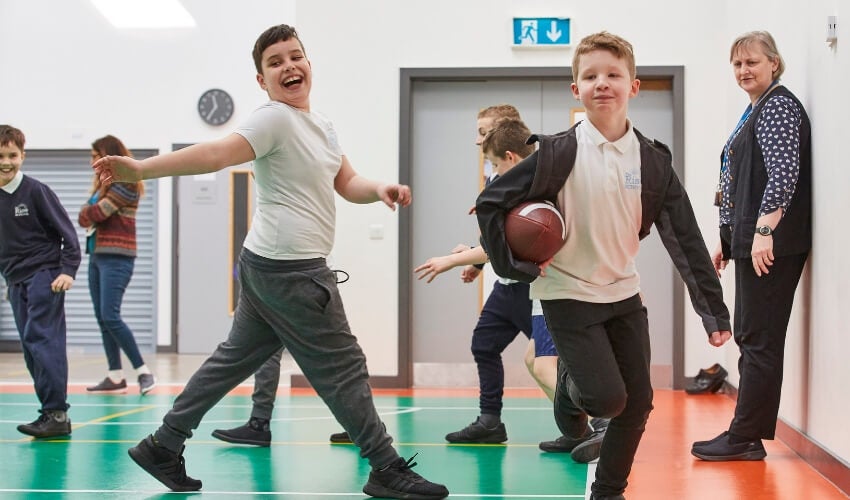
On this page, you will find details about our curriculum offer at The Rise School. If you have any queries or wish to find out more about our offer, please contact us at info@theriseschool.com
In the primary school the curriculum is divided into eight areas which contribute to the development of the key skills, both academic and personal in order to be successful.
Our social curriculum is a fourth core subject and is essential for the holistic development and wellbeing for our young people.
You can download a colour coded primary school curriculum.
The table shows how the number of lessons per week for each subject in Key Stage 1 (KS1) and Key Stage 2 (KS2).
English is central to our curriculum at The Rise School and here's why:
- English unlocks pupils’ access to all other areas of the curriculum.
- GCSE English (or equivalent) is a core qualification needed to access opportunities beyond school.
- Being functional in English is necessary for participation in society.
- Reading great stories and literature is an important way to learn about ourselves, others and the world around us.
Initially, we deliver the Read Write Inc Phonics programme in primary to ensure that pupils can confidently decode texts. Pupils then move on to follow the exciting Ruth Miskin Literacy and Language programme.
View the primary curriculum in more detail.
Science is an important part of the curriculum at The Rise School because it helps us to understand the world around us. Everything we know about the universe, from how trees reproduce to what an atom is made up of is the result of scientific research and experiment.
View primary curriculum in more detail.
Arts and culture are truly celebrated at The Rise School because lessons are tailored to allow all pupils the opportunity to explore the arts in their own way and to meet their diverse needs.
Our pupils take part in two or three art and design lessons a week. They work closely on the process of creating art mindfully by exploring different mediums – e.g. paint, oil pastel, sculpture, printing and photography.
View primary curriculum in more detail.
Learning music enables pupils to form many cross-curricular links, as well as learning to be creative and expressive, and to collaborate with others in a variety of ensembles.
Music proudly brings our community together with regular performances to showcase our talents. At The Rise School we encourage pupils to be inquisitive and creative through music.
View primary curriculum in more detail.
Within the PE curriculum our primary school look at developing pupils Fundamental Movement Skills (FMS). FMS skills are important because they are the “building blocks” or foundation movements for more complex and specialised skills. These are required by pupils throughout their lives to competently and confidently play different games, sports and recreational activities.
View primary curriculum in more detail.
Weaving wellbeing is a Personal, Social, Economic and Health Education (PSHE) program designed to teach children skills and strategies which develop positive mental health. The skills are based on current research from the field of positive psychology.
View primary curriculum in more detail.
At The Rise School we follow a bespoke computing curriculum broadly based on the National Curriculum. Pupils gain skills and knowledge in computer science, information technology (IT) and digital literacy.
In computer science pupils learn a range of skills covering algorithms, decomposition and computational thinking. They are introduced to a range of programming tools including, both block based languages such as Scratch and textual languages such as Python.
View primary curriculum in more detail.
Through yoga lessons pupils will focus on the following four key aspects: ability to calm, flexibility, strength and co-ordination. Yoga is part of the schools wellbeing curriculum and is aims to support our pupils in creating a positive sense of self, alongside increased body awareness.
We aim to achieve this by developing and providing pupils with self-regulating skills that can be added to their ‘tool kit’ and be called upon across all aspects of their lives. It also provides them with essential relaxation time that allow them to recharge both physically and mentally.
View primary curriculum in more detail.
The inclusion of history in the curriculum is part of our core commitment to pupils learning under a broad, balanced and age-appropriate curriculum. We believe that history is a vital part of an all-round education and much more than simply studying events from the past. In the Primary school, pupils begin to study history through topic-based lessons. They develop their skills during KS3 and, where appropriate, will be entered for GCSE history in Year 11. Through history, pupils come to understand how and why society is the way it is, and how we, as informed citizens, can learn from the mistakes of the past and make better choices for the future.
Through the study of history, pupils:
- learn about unique historical principles such as ‘causation’ and ‘significance’
- learn useful skills that transfer to other subjects in the curriculum, such as the ability to compare, describe, analyse and evaluate
- can express and justify their opinions
- acquire useful skills for the workplace, such as critical thinking, and weighing up pros and cons before making a reasoned decision.
View primary curriculum in more detail.
Personal, Social, Health and Economic Education (PSHE) is more than just subjects – they are life lessons. They inform pupils and empower them to become advocates of important issues. They help pupils be more informed and open minded.
Pupils also learn about their rights and responsibilities. They receive important lessons in using critical thinking in relation to the media and the economy.
Pupils engage in debates about important current affairs topics and are encouraged always to challenge the idea and never the person.
Visits to places such as the Houses of Parliament and the Court of Justice also enhance pupils’ learning. View the PSHE curriculum overview.
